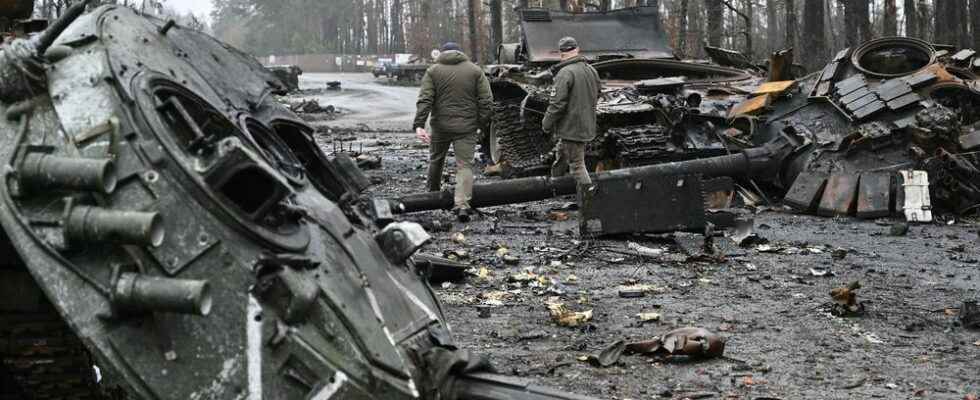Will Vladimir Putin’s “special military operation” in Ukraine officially turn into a war? The hypothesis has gained weight in recent days in Western chancelleries, as May 9 approaches, the date celebrating in Russia the Soviet victory against Nazi Germany and a great moment of Russian patriotism. “I think he’s going to try to get away from his ‘special operation,’ British Defense Secretary Ben Wallace said in a radio interview last week. AML. He laid the groundwork to be able to say, ‘Look, it’s now a war against the Nazis, and what I need is more people. I need more Russian cannon fodder.'”
If this possibility has since been described as “nonsense” by the spokesperson for the Russian presidency Dmitry Peskov, assuring on Wednesday that there is “no chance of this happening”, doubt remains among analysts as to the real intentions of the Kremlin. “The regime has already lied many times in this conflict, points out Carole Grimaud-Potter, founder of the Center for Russia and Eastern Europe Research, based in Geneva. It is therefore difficult to take his word for it.”
Despite the thousands of victims and millions of displaced Ukrainians, the Kremlin has always refused to speak of war since the start of its invasion launched on February 24. But faced with the difficulties encountered by the Russian army – which originally hoped to take kyiv in three days – to win, Vladimir Putin could decide to move up a gear. “We have seen for several weeks a hardening of Russian political discourse, which could serve to prepare the population for a change in scale of the offensive and a possible declaration of war”, continues the researcher.
Troop reinforcements
Whether or not it occurs on May 9, such an evolution would not only be semantic. “Concretely, this could allow Putin to mobilize his reserve forces and enlist more conscripts and for longer,” said Samantha de Bendern, researcher specializing in Russia at Chatham House, a London think tank. On paper, Moscow could thus count on two million reservists and 250,000 conscripts to come and furnish its troops already present in Ukraine, estimated at between 180,000 and 200,000 men at the start of the invasion.
A breath of fresh air that the Russian army would need. On April 25, British Defense Minister Ben Wallace estimated that 15,000 Russian soldiers had been killed in Ukraine and that 2,000 armored vehicles had been destroyed, including at least 530 tanks and 60 planes. “At the start of this conflict, Russia had committed more than 120 tactical battalion groups, or about 65% of its entire ground combat force. At present, we estimate that more than 25% of them they have been rendered ineffective for combat,” he said. before the British Parliament.
Ukrainian soldiers walk between Russian tanks destroyed during fighting in Dmytrivka (west of kyiv), April 2, 2022.
afp.com/Genya SAVILOV
“In a maximalist hypothesis, a declaration of war could also open the way to general mobilization”, slips Samantha de Bendern. According to the Russian Constitution, this can only be triggered within the framework of a martial law decreed in the country in the event of external aggression. “A legal technique to be able to declare it could be to annex the self-proclaimed republics of Donetsk and Lugansk, advances Carole Grimaud-Potter. Therefore, the fighting taking place there could be considered by Russia as an aggression coming from the Ukraine.” At the beginning of the week, the hypothesis of an annexation of these two territories had been deemed “very credible” by Washington.
Mobilization of allies?
At the same time, going into a state of war could also be a powerful lever to stimulate the patriotism of a Russian population hit hard by the massive economic sanctions imposed by the West. At the end of April, the Russian Central Bank indicated that it forecast annual inflation of between 18% and 23% in 2022, while the World Bank anticipates an 11% contraction in Russian GDP over the same period, its worst recession since the fall of the USSR. “Agreeing to sacrifices is more obvious in the perspective of a war than a special operation, summarizes Carole Grimaud-Potter. A fortiori if the regime plays on the memory of the Second World War, still very present in Russia.”
Internationally, the state of war could also be a way for Russia to rally its allies in the Collective Security Treaty Organization (CSTO), bringing together, among others, Belarus and Kazakhstan, so far. hesitant about the idea of working alongside him in Ukraine. In the event of aggression against one of its Member States, Article 4 of the Treaty provides that all the others undertake to provide it with appropriate assistance, including military. “This would allow Putin to increase pressure on these countries to commit militarily to his side, develops Samantha de Bendern. But it is not certain that this is enough, especially in the case of Kazakhstan, which is has been shown to be very reluctant at the moment.”
The concern is more about a possible evolution of the Belarusian posture. On Wednesday, the country’s armed forces began a “surprise” large-scale military exercise to test their combat readiness. In the initial phase of the conflict, part of the Russian forces had rushed from Belarus – neighboring Ukraine – to attack the north of the country, including the capital kyiv, without the Belarusian army taking part in the fighting. . A few hours after the announcement of new military maneuvers by Minsk, Ukraine said it was “ready” to face any eventuality.
